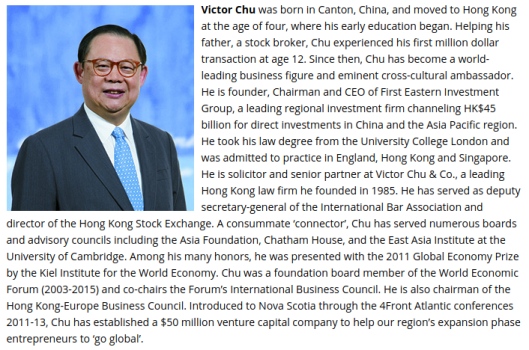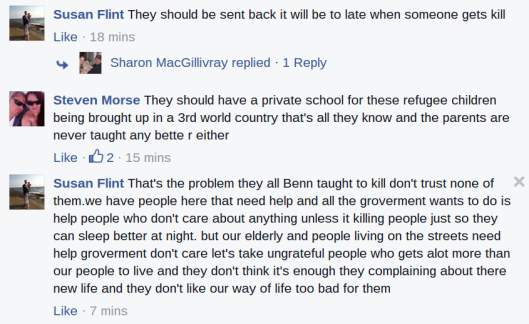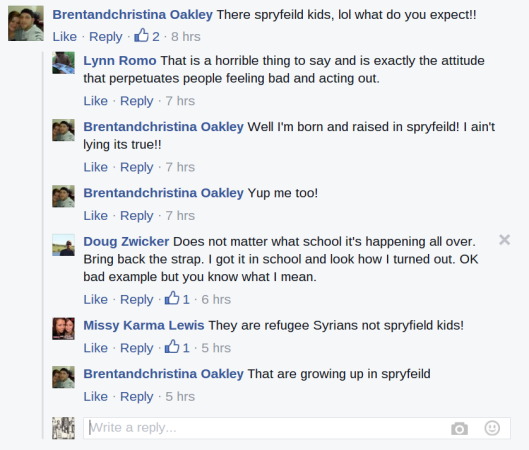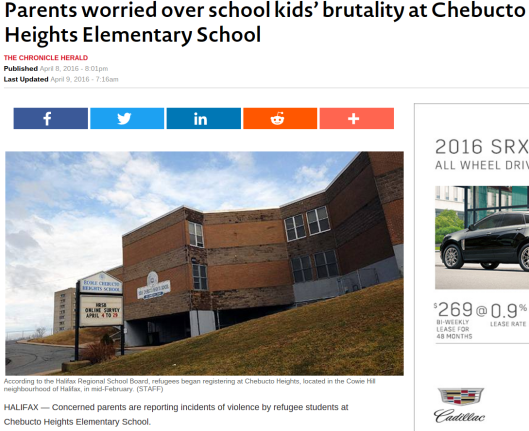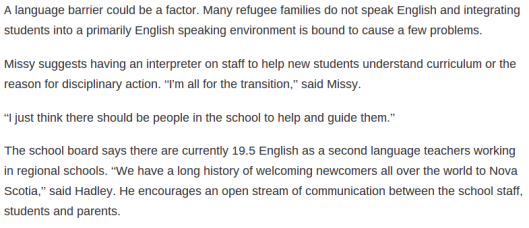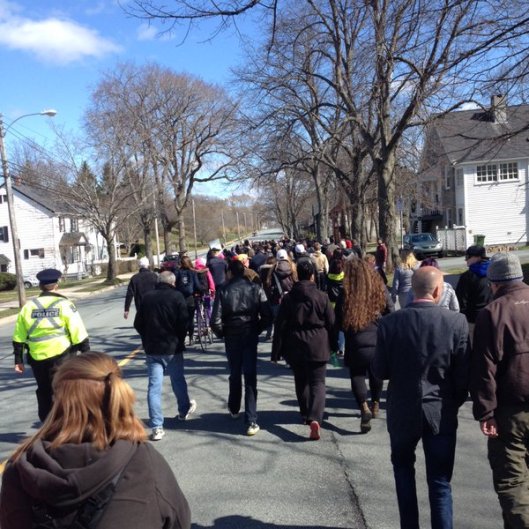
Tyler Richards was shot last weekend. At the time he was the fifth person murdered in Halifax in 2016 (a count that has now risen to seven). He was the first of three people to be murdered last week. I knew Tyler. I didn’t know him well, but I knew him in the way that you know people in Halifax. When I was a teaching assistant at King’s I shared an office with eight other TAs and contract instructors that was in the King’s gym. Tyler had just signed with the Rainmen and I was a season ticket holder. Tyler was the only player who I would see in there on off days or the morning before afternoon practices shooting threes for hours on end. So we talked – never too deeply but we talked and I knew him. I was friends with people he went to high school with and we talked about them. He was in his first year as a pro and at the time I was at the tail-end of my unhealthy obsession with minor-league hoops so he would ask me for scouting reports on upcoming opponents (he may have just been nice and humouring me).
He was one of a handful of young local players that the Rainmen tried to bring in over the years but he was the first one who felt like he truly belonged in the league. His early games were rough but he became a valuable player off the bench. We talked about that and we both agreed that it was because he knew what he was going to have to do to stick around on the team: he’d have to not make mistakes on the court, hit open threes and above all else play defence. He spent hours in the gym making sure he’d hit those threes and hit almost 40% of them in games. He stopped trying to do too much and cut down on turnovers. He harassed opposing ball handlers and fought through screens harder than any of the guys from the Division I programs.
But he made mistakes off the court. They’re well documented and the violent acts are impossible to defend. He forced the team’s hand and made it impossible not to cut him. I ran into him once since then and we made small talk. Next I would hear about him he had been shot dead in a house in the West-end in what appears to be a drug-trade related murder. I knew Tyler. I didn’t know him well but I knew his flaws and his shortcomings and his charm and his gifts. Tyler didn’t deserve to die.
Dan Pellerin was stabbed to death in August of 2014. I knew Dan. I went to high school with Dan and we played soccer together for Dartmouth High. He was a grinder. He fouled hard and he’d play through injuries. He wasn’t the most skilled player but he was solid in a way that a lot of guys playing on the backline of a high school team weren’t: He was a solid passer, knew how to hold a defensive line and he rarely lost his mark. He dove in on tackles sometimes but if he got beat he chased the person down rather than hanging his head. He never played at a particularly high level but he loved soccer. He loved talking about it and playing it and he cared about it. He was the kind of guy you want as a team mate. After high school we lost touch – I went to university and had stopped playing soccer, he stayed in Dartmouth and started a family before moving out west to work to try to make ends meet. He came home and his best friend stabbed him to death one night near a community centre in North End Dartmouth. I knew Dan. We hadn’t seen each other years but I knew him. Some of my former classmates claimed that before he went to Alberta to work Dan was involved in the illicit economy that so many people need to rely on to survive, I have no idea if any of that was true, but it doesn’t matter. I knew Dan and he didn’t deserve to die.
Jefflin Beals was murdered in October 2011. He was shot near Trinity-Bellwoods Park in Toronto the night of Nuit Blanche, that city’s big outdoor art festival. I knew Jefflin. We played junior high basketball and touch football together. He was always small but was a hell of a point guard and unlike me he would go on to have an excellent high school career. I was a good athlete but not a great basketball player, Jefflin was a fucking prodigy.
Because there was a player on team who hated coming off the bench we used to start small with four guards and I’d come off the bench. I was fine with that. I just wanted to win games. That player was one of Jefflin’s good friends at the time. In our last playoff game (I think it was at Caledonia) we were way behind at halftime and felt demoralized. I remember an awkward silence in the locker room and Jefflin looking at the coach and saying that I needed to start the second half and not come out. The rest of them could score he said, but they needed me to grab rebounds and play defence. He was right but I sure as hell wasn’t going to say it. The coach paused for a second, I looked across the room and saw Jefflin glaring at his friend as if to say “Don’t disagree or protest,” and the coach said I was starting the second half. We came back from a big deficit to send the game to overtime after Jefflin picked off a pass that would have lead to a winning basket for the other team in the final seconds of regulation. We lost the game but I still remember those minutes in the locker room despite not remembering much from 15 years ago. He was the best player on the team by a wide margin and he went to bat for me and at the same time told me exactly what I needed to do not to betray him on it. He didn’t need to trust me or stick up for me but he wanted to win as much or more than I did, so he spoke up. I took it to heart and to this day the only reason people don’t hate playing pick up with me is because all I do is defend and try to grab every rebound within fifteen feet of me.
He wanted to win and he willed himself into being a better basketball player than his size ever should have allowed him to be. But he couldn’t will himself out of the life he found himself in. He had numerous drug convictions. The same year that I graduated from university and went off to start grad school I heard from an old friend that someone tried to shoot Jefflin in a drive-by over a drug-trade dispute. I knew Jefflin. One time 15 years ago he spoke up for me at a junior high basketball game and it stuck with me my whole life. He didn’t deserve to die.
On the choices we make
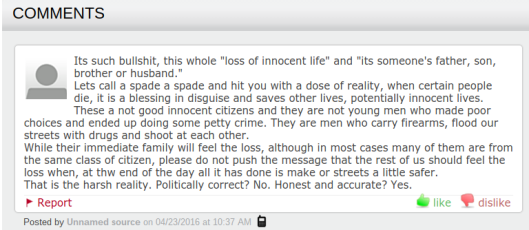
Now deleted comment from The Coast website
In the last five years I know three young men who have been murdered. All three were rumoured to have been involved in the drug trade. All three I knew from sports. All three deserve to still be alive. I’ve been sickened in the last week with comments insinuating that because the most recent shooting deaths in Halifax involved people allegedly involved in the sale of illicit drugs that they brought it upon themselves. I heard it when Jefflin died. I heard it when Dan died. Everytime I hear it I know that it’s bullshit.
We make choices, but those choices are constrained by the structures we live under. The choices I’ve made that make me safe – to go to university (twice), to live in downtown Halifax, to work for political organizations that pay me a living wage – are choices that were available to me. Those choices aren’t available to everyone and the politics, economics and geography of this city put hard constraints on the choices people get to make and to pretend otherwise is to fundamentally misunderstand what violence is.
I knew those three people through sports and I remember all three of them because they were relentlessly hard workers. We tell kids that the lessons of sports translate into life success. Teamwork, hard work, sacrificing for others, commitment, practice, leadership: these are all things that are supposed to be the great lessons of youth sports. I was a teammate of Dan and Jefflin and I watched Tyler for years – you can’t tell me that the three of them didn’t work hard and sacrifice for others in sports and in life. But I was born to parents who went to university and were able to give me a middle class upbringing. I grew up a bit further south in Dartmouth. I was born half-white and half Asian-instead of black. (Dan was white, but the victims of reecnt gun violence in Halifax have been disproportionately black) So my hardwork has given me access to much more than their hardwork ever could and my many mistakes have cost me much less than their mistakes cost them. They didn’t deserve to die just because they were unlucky enough to be born into a system where the odds were stacked against them from the start.
I don’t blame working class and poor people who find themselves involved in illicit activity to make ends meet. I blame a system that so limits their available options that they sell drugs to support families or to build a better life. I blame a system that says that we will always have a class people who are poor and the best you can do is hope that you’re not a member of that class.
On race relations and urban renewal
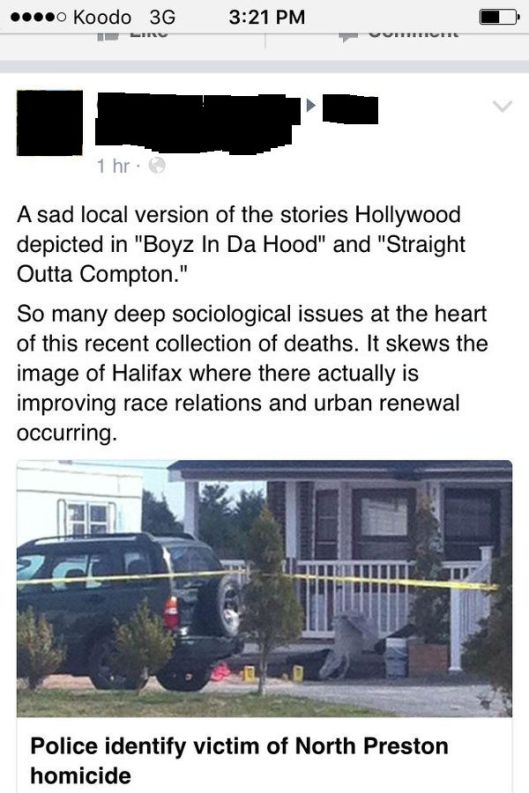
Comment posted on a public facebook group by a local blowhard
At the rally Against Violence on Sunday there was a series of early speakers including politicians emphasized personal responsibility. Thankfully about the halfway point a series of speakers starting with Tendai Miyoba Chiganze-Handahu and including El Jones and Isaac Saney injected politics into the conversation. (If you weren’t there then you really should watch Chiganze-Handahu’s remarks) One of the things that some of the later speakers all pointed to is that the violence we’ve seen is the result of structural exploitation and oppression. Importantly they highlighted the need to reject the incorrect stories that place collective responsibility not on structural factors but on problems within the black community including damaging racist rhetoric around black on black violence and the nature black families.
The violence we’ve seen lately has disproportionately impacted Halifax’s black community, but to blame that on problems which are internal to that community fundamentally ignores the deep structural inequality built into Halifax’s economy, its politics and even its geography.
A local blowhard recently claimed online that this is happening despite improvements in Halifax’s “race relations” and “urban renewal.” This sort of language dodges political questions; that is to say, it avoids confronting questions of power. Who has power? What do they do with that power? How is that power contested? Who is exploited and who profits from exploitation?
To say that urban renewal is improving is to ignore he important and obvious question: whom does urban renewal serve? Halifax has been undergoing an unsustainable building boom for at least the last five years both downtown and in suburbs. To look at a moment when a young black man was gunned down in North Preston and not connect it to the uneven distribution of wealth in this city is astounding. North Preston was an area settled by black loyalists in the 1700s and 1800s and is largely cut off from the rest of the city due to its distance from the peninsula and a lack of proper public transit access. Importantly, many of the descendents of those initial loyalists have never been given proper legal title to land that has been in their families for centuries. The result is legal instability and the inability to sell land (or even transfer it to family members) at a time that downtown and suburban property owners are making huge profits buying, developing and selling property. We have overwhelming evidence from the United States that the inter-generational wealth gap between white and black is tied directly to home ownership and government policy.
Blindly praising urban renewal requires one to ignore the fact that while a wealthy developer received hundreds of millions of dollars to build a hotel and convention centre from all three levels of government the Liberals have cut funding from a 33 year old African Nova Scotian run community organization that helps people Preston and Cherrybrook find jobs. In recent budgets we’ve seen no new funding for public housing, no new money from the province to improve public transit to Halifax’s working class and poor suburbs, and no additional support to create jobs in predominantly black or poor neighbourhoods. The province refused to provide help to Harbour City Homes, a north end Halifax co-op which provides co-op housing for low income residents. It requires overlooking the huge battle that community groups – largely organized by black and indigenous community members – waged to be allowed to use a closed down public school instead of having it sold to a company owned by two of Halifax’s richest real estate dynasties. It requires one to forget that the developers won. Halifax is geographically segregated along lines of race and class and there is no evidence that current construction boom does anything at all to reduce those problems.
Gentrification and urban renewal exist within a broader economic system in which uneven development across space is not an accident but a necessary aspect. Urban renewal by private developers is not a solution to the problems that plague places like Spryfield, Preston and the north ends of Halifax and Dartmouth but an integral part of a process meant to generate profit for some people at the expense of others. This city isn’t working for everybody and until we acknowledge that this is a political problem that requires political solutions nothing is going to change.
Likewise, the language of race relations ignores the actual problem. The problem is not about how members of various races get along with each other. The problem is white supremacy. While “race relations” may be working in Halifax for middle aged white people, for many of us large scale improvement is not so obvious. This is the city where our newspaper of record published this monstrosity just a few weeks ago, stoking the flames of racist and xenophobic hate. This is a province where the education system continues to fail black students. A province where one hour from Halifax an interracial couple had a cross burned on their lawn. A city where international students still find themselves subject to racist taunts and overcrowded and illegal housing. A province where African Nova Scotians face an unemployment rate of 14.5% and are less likely to have a university or college education when compared to the population as a whole. A province where African Nova Scotian and Mi’kmaq communities are far more likely to suffer the impact of toxic industrial and government pollution. And most obviously, this is a city where three black men were gunned down last week. Fuck your race relations, let’s talk about white supremacy.
On what comes next
I am sick of seeing a report of a murder on twitter or facebook and wondering if it will be someone I know. But more than that I am sick of hearing about another murder in this city at all. Tyler didn’t deserve to die. Jefflin didn’t deserve to die. Dan didn’t deserve to die. The reason they didn’t deserve to die is not because I knew them. They didn’t deserve to die because no one deserves what happened to each of them.
The solutions aren’t easy or simple. Their causes are bigger than this city. In the long run, as long as we have a system which protects the right of the few to exploit everyone else in the name of profit we will continue to have poor neighbourhoods, too few jobs and inadequate social programs for those in need. But in the short and medium term there is real hope to reduce the violence.
The solutions need to come from the communities affected. The CeaseFire program has shown real success so far in reducing violence immediately without subjecting black and poor neighbourhoods to further police harassment or sending more people to prison. It’s also run by people from neighbourhoods and communities which have to live with violence, with policing and with poverty. It’s important not just that programs be in place to stop violence but that these neighbourhoods are able develop community infrastructure and that jobs created by these programs go to people who live there.
De-escalating violence through programs like CeaseFire is an important short term fix but in the medium term all levels of government need to listen to what people have been saying for years: there needs to be new job programs (eventually leading to full employment), improved social services, better public transit, non-carceral forms of justice, more teachers and support workers in public schools, and a renewed commitment to affordable, high quality public housing. We need programs which work to challenge structural inequality and offer immediate relief. These programs will all be incredibly expensive, but I dare you to tell me that John Bragg or Frank Sobey or Joe Ramia keeping a bit more of their ridiculous wealth is more important than the lives of the people who were murdered this week. I fucking dare you.
On Sunday Dr. Isaac Saney spoke shortly after Chiganze-Handahu. Unlike too many of Halifax’s academics Saney is deeply embedded in the social movements of this city. He’s also a brilliant and fiery speaker with a commitment to radical politics. He called on the crowd to remember the legacy of the late Burnley Jones, Halifax’s greatest political organizer. Specifically he recalled Jones’s commitment to an independent and radical black politics to challenge the status quo and make demands on the state that cannot be ignored. Here lies the most likely path forward. In the months and years to come we surely see the emergence of self-organizing in communities who have simply had enough. Indeed, we’ve already seen it with the announcement of African Nova Scotian activist Lindell Smith entering the city council race in District 8 and the increasing strength of Halifax’s various ACORN chapters creating a platform for Halifax’s poor to organize around political demands.
For those of who aren’t black or who aren’t poor or who don’t live in a neighbhourhood which has seen an up-tick in gun or gang violence our task is different. Working on your shit or unpacking your privilege may perhaps provide some comfort for you but it is not an organized political response. Instead we need to show up when we’re called to do so – that means bodies at rallies but it also means ensuring that our own elected officials have no choice but to allocate the resources that the African Nova Scotian community is going to demand. It means that we share our skills and our resources when asked – right now that means that candidates like Smith need donations and they need volunteers. He has to win in District 8 and no one who gives a shit can sit this one out. It means that we do not ignore the state and the resources which it makes available – projects of self reliance or building autonomous zones will not produce the resources needed to stem this tide of violence. Violence that needs to be dealt with right now. It means that we re-commit to the social movements we are members of and double down on the work needed to push them in radical directions committed to destroying white supremacy, capitalism and imperialism. When we need to fight our movements need to be ready. Right now they aren’t.
Beyond that I don’t have answers. All I know is that we’re still in a crisis and the response by all levels of government has been inadequate and made things worse. I know that the problems are structural and over-emphasizing personal choices will only make finding real solutions much more difficult. I know that the powerful in this city and this province have long and ongoing legacy of oppressing black people and ruthlessly exploiting working people. I know that they won’t give up the resources that the rest of us need without a fight.
But above all else I know that Tyler, Dan and Jefflin didn’t deserve to die.

